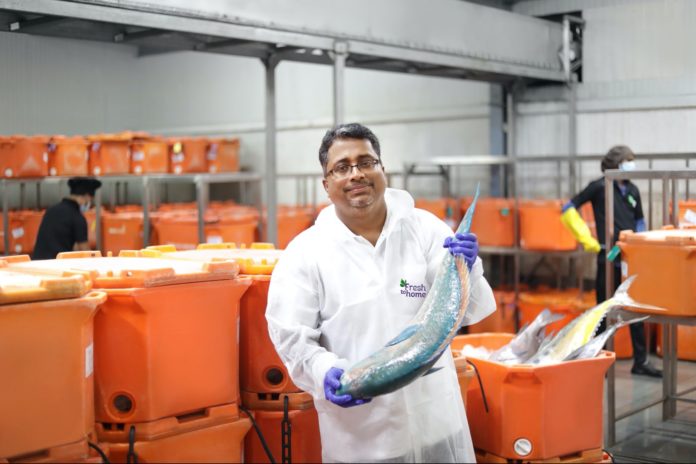Opinions expressed by Entrepreneur contributors are their own.
You’re reading Entrepreneur Middle East, an international franchise of Entrepreneur Media.
Since launching FreshToHome, an e-commerce platform for preservative and antibiotic residue-free fresh fish and meat that operates in India and the UAE, in 2015, its co-founder and CEO Shan Kadavil has succeeded in realizing a number of major achievements for the enterprise.
For instance, FreshtoHome now has more than 3.5 million registered users across the UAE and India. Plus, today, it offers more than 2,000 certified fresh and chemical-free products, and it has, so far, delivered more than two million orders across more than 160 cities. And the latest announcement from the enterprise is that it has raised US$104 million in a Series D funding round, with Amazon Smbhav Venture Fund, a $250 million India-focused venture fund, leading it. “The current funding will strengthen our mission to make 100% preservative- and antibiotic residue-free fish, seafood, and meat accessible and affordable to millions of meat lovers,” Kadavil says.
Of course, it is to the enterprise’s credit that Fresh To Home is already a brand that is recognized for its quality, consumer trust, and technology-enabled offering. “Our Commodities Exchange empowers over 4,000 fishers and farmers to electronically auction their produce for sale on our platform,” Kadavil says. “This process ensures that customers get the best products within 24–36 hours of sourcing. Additionally, an end-to-end cold supply chain, and 100+ quality checks for standard chemicals, antibiotics, and preservatives make FreshToHome enable access to only safe and healthy products that adhere to national and international food regulatory standards, and are certified by reputed agencies.”
 Image courtesy FreshToHome.
Image courtesy FreshToHome.
The company’s Series D round marks the official entry of Amazon in the branded direct-to-consumer space, while it also brought the support of its existing investors, including Iron Pillar, Investcorp, Investment Corporation of Dubai, Ascent Capital, as well as new investors like E20 Investment Ltd, Mount Judi Ventures, and Dallah Albaraka. Two years ago, FreshToHome had raised $121 million in a Series C round, led by Dubai’s Investment Corporation of Dubai, Investcorp, IronPillar, Ascent Capital and US International Development Finance Corporation (DFC).
Commenting on the influx of funds his enterprise has gained over the years, Kadavil says, “As a growing startup, fundraising at different stages helped us strengthen our core mission to make fresh fish and meat affordable and accessible to all meat lovers, while also increasing the wealth of investors. New investments have added heft to envision the tech infrastructure we wanted to build to enable user-friendly tech solutions to our fishers community in order to eliminate the dependency on the middlemen. Our Series C round helped us to become a pan-India brand, expanding our presence geographically, and eventually getting us a brand closer to our customers upholding our mission of providing toxin-free food to the next million.”
In the UAE, FreshToHome operates with a full-fledged sorting and processing centre, engaging a direct and indirect workforce of more than 400 people, and delivering across the country. The company plans to target Saudi Arabia next, in addition to strengthening its offline and online channels, as well as deepening its sourcing advantage to add value to its customers and other stakeholders. “The UAE contributes nearly 15% revenue share, and it holds a focus area with great potential,” Kadavil adds. “I should say that it is because we have an early mover advantage in the UAE e-commerce landscape. We function as a local homegrown company, and thereby, we have clearly grown and maintained our customer loyalty to become their favorite ‘fresh’ brand, owing to the promised quality including safety, variety, and cooking convenience we offer in our platform. We optimize our sourcing, and ensure a farm-to-fork cycle is less than 24-36 hours for our customers in the UAE.”
 Image courtesy FreshToHome.
Image courtesy FreshToHome.
Kadavil’s enterprise also has earned itself the moniker of being a proficorn, which means that it’s a profitable company, as opposed to being just a unicorn with a high valuation. When asked for advice he’d give other founders to build proficorns, Kadavil starts by advising them to aim to balance growth with profitability. “From the start, we believed that while top-line growth is important, bottom-line is equally important,” Kadavil explains. “Bottom-line focus does require a strong moat, along with stellar execution to drive the differentiation, so it’s not enough just to have a good brand, or it will be hard to run a profitable company. The key driver is the value to customers and farmers, along with emphasis on business margins.”
Secondly, he advises founders to focus on technology, explaining that he also heavily relied on artificial intelligence (AI)-based technology to disrupt the traditional sourcing industry. “This was a win-win for the farmers and fishers, and the consumers,” Kadavil says. “To give you our example, most of our time and investments in the last seven years went into building a fishers-facing tech platform on the sourcing side, working with over 4000 fishermen and farmers, cutting off middlemen, and enabling them to sell directly on our commodity exchange platform.”
Lastly, to build a profitable company, Kadavil advises, its founder needs to put stakeholders at the core of its business model. “The fishers community, our customers, and our investors have been the foundation of our business model, and at every stage, we have strived to create value for all our stakeholders,” he adds. “By focusing on a robust cold supply chain to reduce waste, ensuring prompt payment to fishers so that they do not knock money lending sharks, we were able to pass on the benefits to our customers and enhance our margins with a win-win situation to all.”
Source link






